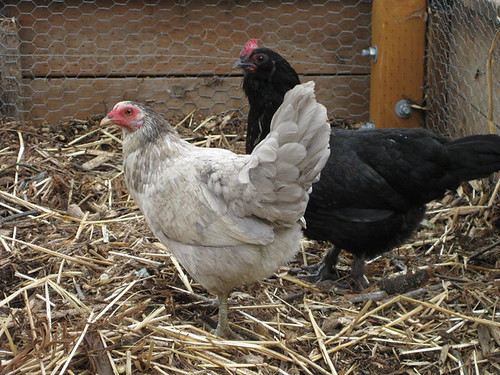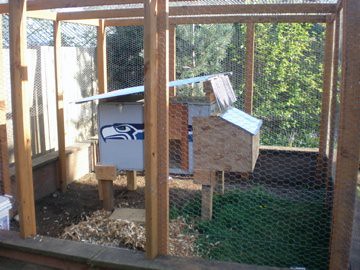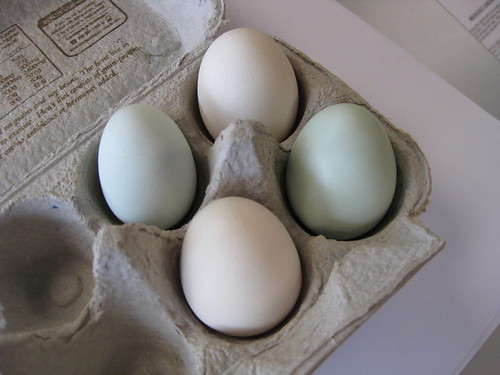
While researching urban chickens for Monday’s article about Kippen House chicken coops, I decided I needed a first hand account of what it’s like to raise chickens in the Central District. Many CD residents like Rachelle Brown already raise hens in their backyards. When I asked if I could check out her chicken coop, she was happy to oblige. But she warned me to wear shoes I didn’t mind getting messy. On that advice I laced up my grunge-era Doc Marten boots and stomped down the block and into my neighbor’s backyard.
Brown and her family keep three bantam chickens in the backyard of their Squire Park home. For their coop, Brown and her husband, Scott Meola, reworked a box they designed to attach to bicycles for tailgating at football games. Their hens Betty, Bleu and Spartaca appear to be big football fans with a Seahawks logo painted on their coop. The roof of the coop was the hinged lid of their tailgating box, so it opens easily for cleaning. Brown and Meola added nesting boxes and some clear plastic roofing to give the hens daylight, which they need in order to stay happy and lay eggs.
Raising chickens takes time – you can wait up to six months for your first egg. “If you want eggs right away, consider buying year-old hens,” Brown suggested. She recommends you have at least three, as they are flock animals and need companionship.
To allow their chickens more space to roam safely during the day, they built a larger fenced-in chicken run outside the coop and completely surrounded it with chicken wire. When she’s home she can open the gate and the chickens can roam freely around her backyard, fertilizing the grass. Gardeners like chickens because they peck through the soil eating bugs while leaving the fruits and vegetables untouched.
“They help control slugs, snails, and other bugs in your garden if you let them free range, plus till your soil and garden beds,” said Brown. She admits, however, that giving them free range of your yard means more mess to clean up.
“Chicken poop is messy and smells, so one must be prepared to manage a mess. The mess gets bigger if you let them free range without restrictions,” she said. But even that has its benefits. “Chicken waste is the best fertilizer if it’s been composted properly,” said Brown.
Even with a secured coop and a fenced-in chicken run, raising chickens in the city isn’t easy. Brown says rats and squirrels find their way into the coop whenever they can to eat the chicken feed. Parasites and mites on the birds and in the coop have to be mitigated as well, and raccoons, opossums, dogs and hawks are common predators they must beware of.
Additionally, she said finding and purchasing chicken feed can be difficult. She has driven to Auburn and Federal Way to buy the organic feed she uses for her chickens.
“I’ve ordered it online too, but that gets expensive because it’s so heavy and costs a lot to ship,” she said.
Still, Brown insists that the benefits of raising chickens outweigh the challenges.
“Chickens are curious, fun and smart animals, generally pleasant to have around and great for kids to learn aspects of the ‘circle of life’ and how food is produced,” said Brown. Chickens eat your food scraps so you know what’s going into them, you have less waste and, in the long run, better compost. And of course, one of the greatest benefits is the fresh eggs.
“It’s about 10 minutes a day and an hour cleaning the coop and sanitizing the feeding and watering containers every other weekend,” Brown said. “It’s not a lot of work, there are just a lot of things to be mindful of.”
Betty, Bleu and Spartaca certainly seem to appreciate all the attention.
Photos courtesy of Rachelle Brown
Do you raise hens in your backyard? Do you grow your own vegetables or share a community p-patch or garden? Have you joined the urban agriculture movement here in the Central District? Please post your pictures or share your stories to let us know what’s growing in your corner of the neighborhood.




Next to Nature pet store in West Seattle stocks organic Layer feed. It costs a little more than going to the burbs but is alot easier to get to.
Cedar wood shavings are perfect for nest boxes and bedding. It keeps the mites down, smells nice, and the woody fiber gives balance to the Nitrogen and Phosphorus in the manure. At about $10 a bale its pretty cost effective too.
Our chickens compost our kitchen scraps too. They eat just about anything. They really like corn on the cob and watermelon rinds. Cheese rinds are a big hit too.
The labor input is pretty low too. Most days we just open and close the doors. It is important to do this right at dusk for Raccoon protection. Mostly it is just making sure they have enough food and water. Far cheaper and easier than taking care of a dog and you get eggs back.
There is a great yahoo group to join to learn more about urban farming from chickens to ducks to goats. Check out ‘seattle farm coop’ on the yahoo groups page. They also have a supply warehouse near the Tully’s bldg in south downtown. (although may be changing locations). They also carry organic feed! Great article! (Love the Seahawks pride!) This article is great and helps to demystify the choice of raising chickens. I can’t wait to hear more stories!
Love them… and they are so easy to care for. They were born in April, we bought them from a farmer in August and they started laying during the Thanksgiving snowpocalypse. We have more manure than our garden can handle. You can buy organic chicken feed at City People’s in Madison Valley – probably the closest place to the CD. We let our chickens roam the yard occasionally but be warned they will snack on prized vegetation. They are eating our lettuce and kale which is not an issue now because it is leftover from last summer. We’ll see how it goes this summer…
Did you build your own coop? Are those greens that are growing above their cute little heads? :)
I’d love to see more pfics of your setup. It’s going to be a few years before we get them but I like to plan.
That is an ADORABLE coop…love the ‘green roof’ – kinda like Kippen House. Very nice. Those chickens look happy! :)
Everyone’s been asking me if I’m getting chickens now, but the answer is “no”…my house is crazy enough without chickens in the backyard! But they are pretty cool.
We paid Berg (in Ballard) of http://www.seattlechickencoops.com to build it. We were his first green roof and we were quite happy with how it turned out. We just have sedums planted in it. I’ll look for more photos soon. There’s a photo on Berg’s website of our coop.
We designed and built the coop ourselves. We get all our feed and supplies through Seattle farm Co-op, http://www.seattlefarmcoop.com/
One of the best places to learn about raising chickens is http://www.backyardchickens.com/
Wow, that is a fancy chicken coop, and human-height I see! How adorable is that. Love it!
Lande Feed of Renton delivers feed and bedding and medication. The owner knows a lot about chickens and is very helpful. He’s often in the CD 1x/week. Craig Lande 206-371-6463
Just have to compliment you all on the well written, honest, and low key article, along with the helpful/thoughtful comments about keeping chickens in our neighborhood. It seems like it’s really important to think carefully about the coop, since a seat of the pants chicken wire + old fence boards affair won’t function properly in our tiny backyards. Thanks for the links to local businesses. What breeds do you like best?? Also, does Seattle frown on putting extra chicken poop in the yard waste bins?